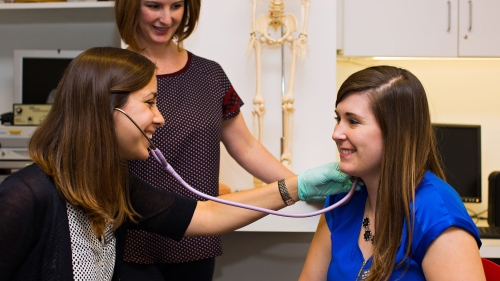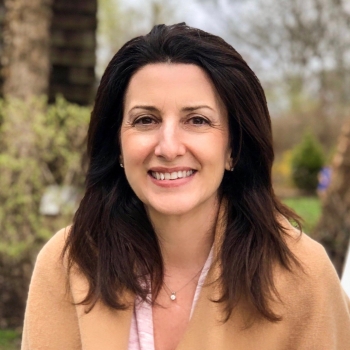

Maria Grigos is a Professor in the Department of Communicative Sciences and Disorders at New York University. Dr. Grigos also directs the Motor Speech Lab at NYU. Her scholarly work combines the use of perceptual, acoustic and kinematic methods to pursue two lines of research. The first centers on the study of speech motor control and motor learning across the lifespan. The second focuses on translational research where she studies the efficacy of motor-based intervention in childhood apraxia of speech (CAS). Research in the Motor Speech Lab is funded by the NIH National Institute on Deafness and Other Communication Disorders and the Once Upon a Time Foundation. Dr. Grigos holds clinical certification from the American Speech, Language and Hearing Association, and is licensed in speech-language pathology in New York State.
Selected Publications
- Grigos, M.I., Tampakis, P., Wang, E., Kolenda, N., Strand, E., Wambaugh, J., Lu, Y., Lyu, Z. & Case, J. (2025). A framework for measuring treatment fidelity in motor-based speech intervention for children with CAS. American Journal of Speech Language Pathology, 34 (5), 2827-2845. PMID: 40875350
- Case, J., Grigos, M.I., Velleman, S., Thomas, D., Murray, E., Anumandla, S., & Iuzzini-Seigel, J. (2025). The pathway to research-reliable DTTC for children with CAS: A multiphase process for training community-based clinicians. American Journal of Speech Language Pathology, 34 (4S), 2359-2382. PMID: 40690303
- Keller, S. *, Valentine, H. *, Harel, D. & Grigos, M.I. (2025). Training on childhood apraxia of speech: Experiences of speech language pathologists. American Journal of Speech Language Pathology, 34 (4S), 2464-2484. PMID: 40455836
- Kopera, H. & Grigos, M.I., (2025). How does prosodic prominence impact articulatory movement parameters and movement variability in adults who stutter? Journal of Speech, Language, and Hearing Research, 68 (7S), 3602-3626. PMID: 40184601
- McCabe, P., Beiting, M., Hitchcock, E.R., Maas, E., Meredith, A., Morgan, A.T., Potter, N.L., Preston, J.L., Moorer, L., …. & Grigos, M. (2024). Research Priorities for Childhood Apraxia of Speech: A Long View. Journal of Speech, Language, and Hearing Research, pp.1-14. PMID: 39173052
- Grigos, M.I., Case, J., Lu, Y. and Lye, Z. (2024b). Dynamic Temporal and Tactile Cueing (DTTC) in young children with childhood apraxia of speech: A multiple single-case design. Journal of Speech, Language and Hearing Research, 67(4), 1042-1071. PMID: 38512002
- Wang, E.W. & Grigos, M.I. (2023). Naïve listener perceptions of speech intelligibility in children with apraxia of speech. Journal of Speech, Language and Hearing Research, 1-15. PMID: 37486797
- Iuzzini-Siegel, J, Case, J., Grigos, M.I., Velleman, S., Thomas, D & Murray, E. (2023). Dose frequency randomized controlled trial for Dynamic Temporal and Tactile Cueing (DTTC) treatment for childhood apraxia of speech: protocol paper. BMC pediatrics, 23(1), 1-14. https://doi.org/10.1186/s12887-023-04066-2
- Case, J., Wang, E.W. & Grigos, M. I. (2023). The Multilevel word Accuracy Composite Scale (MACS): A novel measure of speech production in childhood apraxia of speech, American Journal of Speech Language Pathology, 1-18. PMID: 37195724
- Jing, L. & Grigos, M.I. (2022). Listener ratings of speech accuracy in children with speech sound disorders. American Journal of Speech Language Pathology, 31(1), 419-430. PMID: 34788553
- Jung, S., Jing, L., & Grigos, M.I. (2022). Graduate Student Clinicians' Perceptions of Child Speech Sound Errors. Perspectives of the ASHA Special Interest Groups, 7(4), 1275-1283. https://doi.org/10.1044/2022_PERSP-21-00332
- Li, J. & Grigos, M.I. (2021). Production of English lexical stress by Mandarin speakers: acoustics and kinematics. Second Language Research, 39 (3), 667-695. https://doi.org/10.1177/0267658321106
- Case, J. & Grigos, M.I. (2021). The effect of practice on variability in CAS: A multidimensional analysis. American Journal of Speech Language Pathology, 30 (3), 1477-1495. PMID: 33826355
- Case, J. & Grigos, M.I. (2020). A Framework of Motoric Complexity: An Investigation in Children with Typical and Impaired Speech Development. Journal of Speech, Language and Hearing Research, 63(10), 3326-3348. PMID: 32946304
- Levy-Lambert, D., Grigos, M.I., LeBlanc, E., Alfonso, A., Ramly, E., Kanter, R. & Rodirguez, E. (2020). Communication Efficiency in a Face Transplant Recipient: Determinants and Therapeutic Implications. Journal of Craniofacial Surgery, 31(6), 528-530. PMID: 32649536
- Case, J. & Grigos, M.I. (2020). How the study of speech motor control informs intervention in CAS. Perspectives of the ASHA Special Interest Groups, 1-10. https://doi.org/10.1044/2020_PERSP-19-00114
- Grigos, M. I., LeBlanc, É., Rifkin, W. J., Kantar, R. S., Greenfield, J., Diaz-Siso, J. R., & Rodriguez, E. D. (2020). Total Eyelid Transplantation in a Face Transplant: Analysis of Postoperative Periorbital Function. Journal of Surgical Research, 245, 420-425. PMID: 31442745
- Kopera, H. & Grigos, M.I. (2019). Lexical stress in childhood apraxia of speech: Acoustic and kinematic findings. International Journal of Speech Language Pathology, 1-12. PMID: 30744428
- Grigos, M.I., LeBlanc, E., Hagedorn, C., Diaz-Siso, J.R, Plante, N. & Rodriguez, E.D. (2019). Changes in articulatory control pre and post-facial transplant: A case report. Journal of Speech, Language and Hearing Research, 62, 297-306. PMID: 30950699
- Small, H. C., McAllister, T., & Grigos, M. I. (2018). Investigating the Use of a Nonspeech Task to Measure Tongue–Jaw Differentiation: Findings Across Typical Development. American Journal of Speech-Language Pathology, 27(3), 1030-1038. PMID: 29998348
- Grigos, M.I. & Case, J. (2017). Changes in movement transitions across a practice period in childhood apraxia of speech. Clinical Linguistics and Phonetics, 32(7), 661-687. PMID: 29281317
- Case, J. & Grigos, M.I. (2016). Articulatory control in childhood apraxia of speech in a novel word-learning task. Journal of Speech, Language and Hearing Research. 59, 1253–1268. PMID: 27750297
- Grigos, M. I. (2016). Speech Sound Disorders: What's Motor Got To Do With It? Perspectives of the ASHA Special Interest Groups, 1(1), 75-87. https://doi.org/10.1044/persp1.SIG1.75
- Reuterskiöld, C. & Grigos, M.I. (2015). Non-word repetition and speech motor control in children. Special Issue on Phoniatrics, Biomed Research International. Volume 2015, Article ID 683279. PMID: 26557688
- Grigos, M.I., Moss, A. & Lu, Y. (2015). Oral articulator movement in childhood apraxia of speech. Journal of Speech, Language and Hearing Research, 58, 1103-1118. PMID: 25951237
